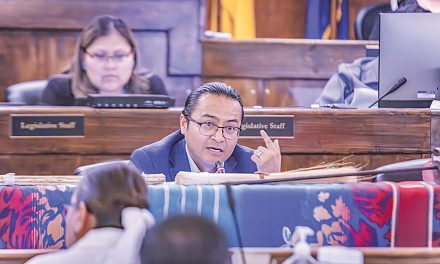
School reps: Give labor relations office more teeth

CHINLE
The Navajo Preference in Employment Act, created to make sure outside companies employed Navajos, is instead creating headaches for school boards and administrations, school officials charged at the final hearing on possible changes to the NPEA here last Tuesday.
Tohajilee School Board member Jerry Chavez, Diné College Human Resources Director Merle Dayzie and Sylvia Hadley, formerly with Rough Rock Community School, all charged that fired school employees are using the act to file frivolous claims with the Office of Navajo Labor Relations, tying up school resources in the drawn-out appeals process.
They made suggestions ranging from instituting a filing fee to cutting the time limit for appeals to possibly eliminating the Navajo Nation Labor Commission — the appeals body for ONLR.
Chavez said in his district, grieving a contract non-renewal has become the norm.
“As a locally controlled grant school,” said Chavez, “we have a right to not renew a contract. Yet every time we do, they get upset and file a grievance.”
If the ONLR denies the grievance, Chavez said, the employee will automatically appeal it to the Labor Commission.
“The process kills time and money from our school,” he said, “resources that should go to the children.”
The school board member noted that the employee has 180 days to file a grievance and another 360 days to appeal it.
During that time, added Dayzie, the school is not only paying its attorney to fight the grievance, but paying the employee, who is probably on administrative leave, and paying someone to take his place until the grievance is resolved.
“If we strip them of pay, then we’re taking adverse action,” he noted. “We can’t touch them because it’s retaliation, and the retaliation claim is more troublesome than the original charges.”
Agreed Chavez, “We’re walking on eggshells.”
Dayzie suggested keeping statistics to see how many times the NLC overturns the ONLR’s verdict, and if it’s hardly ever, abolishing the NLC. The plaintiff would still have the option of appealing to the Navajo Nation Supreme Court, he pointed out.
Barring that, both he and Chavez wondered if the ONLR could issue a verdict labeling a case frivolous, so it stops at the ONLR.
“If it’s frivolous, there has to be something that says, ‘It stops here,’” suggested Chavez.
Seconded Dayzie, “ONLR need some teeth, some authority to say, ‘There’s nothing here.’”
Chavez thought a $75 filing fee might “weed out” the frivolous filers, along with condensing the timeline for filing and appeal.
Hadley noted that some employees are going from school to school, running to the ONLR every time they are fired.
“Could there be a limitation of how many times a person can file with ONLR?” she wondered.
Suggested Chavez, “Maybe there could be something to where ONLR could red-flag that person.”
“Then we’re doing the employer’s job,” countered the ONLR employee who conducted the meeting. He declined to give his name, although the attendees were required to state their names for the record.
But Hadley said it’s hard for school districts to identify these people because they often get their previous employers to sign non-disclosure agreements as a condition for resigning and getting out of their hair.
The ONLR employee said putting a timeline on the grievance process might be fruitless, since the NLC is already backed up by about six months on existing cases.
Dayzie noted the tribe recently closed the Shiprock, Chinle and Tuba City ONLR offices, which seems a strange move if the existing network is already backlogged.
“If we’re really going to acknowledge that you don’t have enough resources to do your job, we shouldn’t cut, we should put more into it,” he said. “Re-open the offices and give the investigators vehicles so that you guys can really do your job.”
Beverly Martinez, legislative adviser to the Health, Education and Human Services Committee, thanked the sparse but vocal audience and said the comments would be compiled with those from the previous hearings and be used to formulate some amendments to the LPEA, which should go before committee by the end of the year.
“The act hasn’t had any amendments since the 1990s, so it’s definitely time to revisit it,” she said.
Written comments are still being accepted on the Council’s website.
To read the full article, pick up your copy of the Navajo Times at your nearest newsstand Thursday mornings!
Are you a digital subscriber? Read the most recent three weeks of stories by logging in to your online account.








 Highway 264,
Highway 264, I-40, WB @ Winslow
I-40, WB @ Winslow